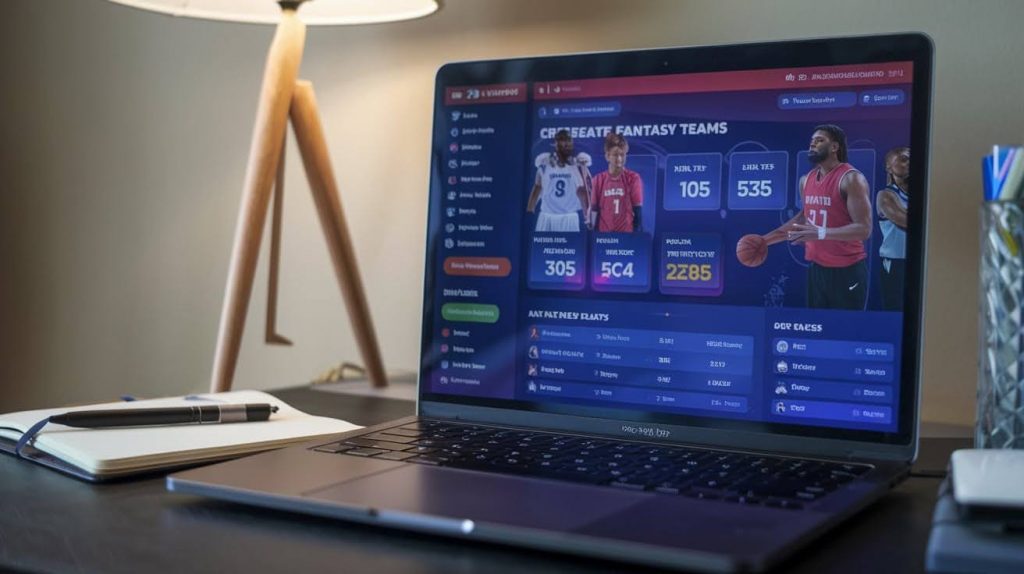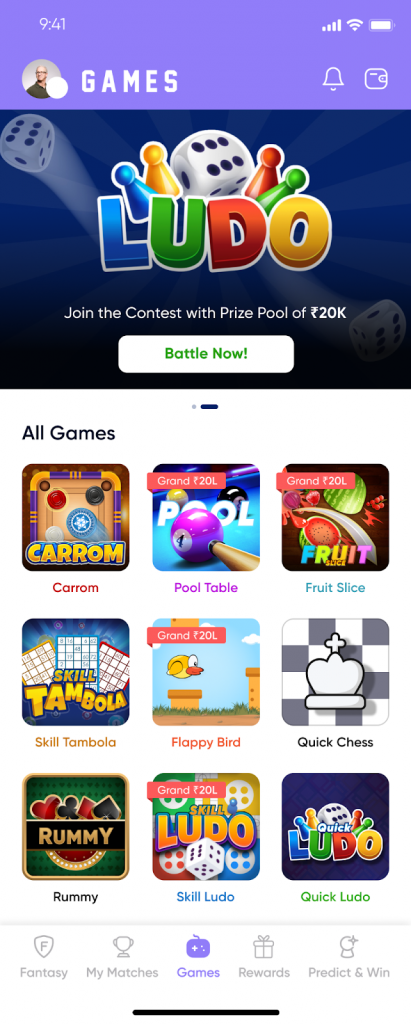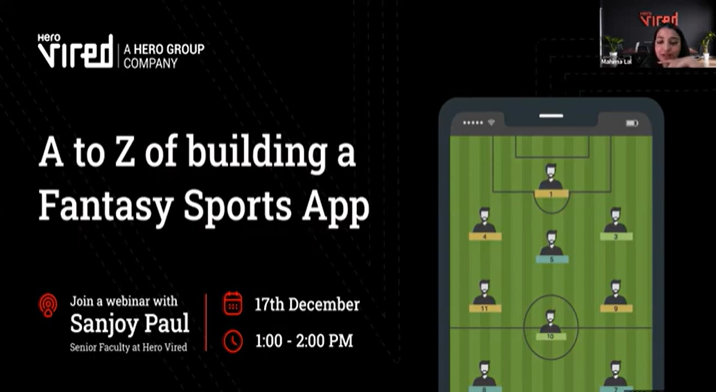Fantasy sports apps are transforming the way fans engage with their favourite sports. With the global fantasy sports market valued at $6.45 billion in 2022 and expected to double to $12.87 billion by 2028, it’s clear that there’s tremendous potential in this booming industry. Substantial monetization opportunities make it an exciting space for anyone looking to launch a successful app.
However, the competition is fierce, and standing out in a crowded market is key. In this guide, you’ll learn the essential steps to build a fantasy sports app that attracts and keeps users hooked. From must-have features to development processes and monetization strategies, we’ll cover everything you need to get started.
Let’s dive in!
Understanding Fantasy Sports Apps
Fantasy sports apps let users build virtual teams from real athletes, earning points based on real-time performance. These apps offer a mix of short-term and season-long competitions, making them highly engaging for users.

Types of Fantasy Sports Apps
Below are a few significant types of fantasy sports apps:
- Daily Fantasy Sports (DFS): Users compete in short-term contests that last a day or a week, keeping engagement high.
- Season-Long Fantasy Sports: Users participate in leagues that span an entire sports season, promoting long-term involvement.
- Social Fantasy Sports: These apps focus on community building and interaction, allowing users to share updates, join leagues with friends, and more.
- Wagering-Based Fantasy Sports: Incorporate betting elements, attracting a competitive audience looking for real-money rewards.

For businesses, the opportunity to stand out lies in creating apps that offer these different formats while leveraging personalized experiences through AI and AR. Source Code Lab can help you build a unique fantasy sports app with the right features to engage and retain users.
Learn more about our Fantasy Sports App Development Services and how we can help you build a successful app.
Essential Features of a Fantasy Sports App
Building a successful fantasy sports app depends on integrating features that create a smooth, engaging user experience. Below are the essential features every fantasy sports app should include to attract and retain users.
- User Registration and Authentication
A simple yet secure registration process is key. Allow users to sign up via email, phone, or social media accounts, ensuring an easy entry point. It’s important to include age verification and Two-Factor Authentication (2FA) to protect user data and secure financial transactions, especially in apps handling payments.
2. Push Notifications and Real-Time Updates
Once users are on board, keeping them engaged is crucial. Push notifications and real-time scoring updates let users stay informed on player performance, injuries, and other key game updates. Reliable third-party APIs ensure the data is accurate, enabling users to make quick decisions that impact their gameplay.

3. Customizable Team and League Management
Users love the flexibility. Offering customizable team and league management allows them to personalize their experience. You should enable users to adjust team rosters, create custom leagues, and choose different scoring systems. This level of control makes users feel more invested in the game, boosting long-term engagement.
4. Social Sharing and Community Engagement
Creating a community around your app is essential for its growth. Integrating social media sharing and in-app communication features like messaging or discussion boards fosters interaction. Adding referral programs and rewards can motivate users to invite friends, helping expand your user base through word-of-mouth.
5. Secure Payment Gateways and Prize Management
Securely handling financial transactions is vital for maintaining user trust. Use secure payment gateways to manage entry fees, in-app purchases, and prize payouts. Compliance with legal standards ensures the app is safe, helping users feel confident about their financial transactions.
For more information on custom development to implement these features, explore our Custom Game Development Services.
Step-by-Step Guide to Building a Fantasy Sports App
Building a fantasy sports app requires several key steps to ensure functionality, user engagement, and success. Here’s a streamlined guide to help you start your journey to creating an engaging app that stands out.
Step 1: Research and Audience Planning
The first crucial step in fantasy sports app development is understanding your audience. Conduct market research to analyze competitors, pinpoint user needs, and identify opportunities to make your app stand out. Create user personas based on audience demographics, interests, and behaviour to tailor your app for maximum engagement.
Keep an eye on market trends, especially emerging technologies like AI and AR/VR, to enhance user experiences and stay ahead of competitors. For custom solutions tailored to your needs, explore the Benefits of Custom Game Development.
Step 2: Choosing the Right Technology Stack
Selecting the right tech stack is foundational for development. You’ll need strong frameworks such as React or Angular for the front end to build an intuitive user interface. Python or Node.js are great options on the backend to ensure efficient server-side functionality.
Additionally, using React Native or Flutter will allow cross-platform development, reaching users on both iOS and Android devices. Security should also be a priority, especially when handling user data and transactions. Make sure your tech stack supports encryption and complies with regulations like GDPR. This ensures user trust and keeps your app secure in the long run.
Also, here’s a helpful tutorial video to make the fantasy sports app development process easier A to Z of building a Fantasy Sports App

Step 3: Design and Wireframing
Your app’s design will play a huge role in its success. A mobile-first design approach is essential since most smartphone users will access your app. Tools like Figma and Sketch can create engaging wireframes and interactive prototypes. Before development begins, these prototypes allow for early testing and help you refine the user interface (UI) and user experience (UX).
Map out straightforward user journeys to ensure easy navigation. Incorporate accessibility features to make your app usable for a wider audience, enhancing overall user satisfaction.
Step 4: Testing and Quality Assurance
Thorough testing ensures the app functions smoothly. Conduct unit testing to check each feature’s performance, followed by user acceptance testing (UAT) to confirm that the app meets user expectations. Performance testing ensures your app can handle heavy traffic, especially during high-demand periods like significant sports seasons.
Testing ensures that your fantasy sports app provides a seamless and reliable user experience right from launch.
Step 5: Post-Launch Monitoring and Feedback
After your app is live, continuous monitoring and feedback collection are vital. Monitor user interactions and address any issues that arise. Regularly updating your app based on user feedback helps you improve functionality and stay competitive. Gathering data-driven insights from users will help your app evolve and enhance user engagement.
For more personalized development strategies, Contact Us today.
Monetization Strategies for Fantasy Sports Apps
Building a successful fantasy sports app requires a well-thought-out monetization strategy. By integrating multiple revenue streams, you can ensure sustained growth and profitability. Below are some key monetization strategies to consider.
1. In-app advertising and Sponsorships
One of the most effective monetization methods is integrating in-app advertisements. These can be banner ads, native ads, or interstitial ads. Positioning these ads strategically—such as during game breaks or loading screens—ensures they don’t disrupt the user experience.
Sponsorships with brands can also offer lucrative opportunities. By partnering with relevant companies, you can introduce branded content or exclusive features, enhancing both user experience and revenue potential.

2. Entry Fees and Contest Subscriptions
Charging entry fees for leagues or tournaments is another popular way to generate income. Platforms like Dream11 successfully use this model, where users pay to enter contests, and the app takes a small percentage (rake) from the total pool.
Offering tiered entry fees accommodates different spending abilities, ensuring casual and high-roll users enjoy participating. Regular contest subscriptions also help maintain a consistent revenue stream by encouraging ongoing user engagement. To better understand the cost considerations of developing such a feature, explore the Cost to Develop a Real Money Game for insights into budgets and financial planning.
3. Premium Paid Features and In-App Purchases
Premium features are an excellent way to increase revenue for users seeking a more advanced experience. Offering paid options like additional team slots, advanced analytics, or custom avatars can enhance user enjoyment and competitiveness.
A freemium model works well in this scenario, allowing users to access basic features for free while offering them enticing paid upgrades. These premium features can deepen user engagement and lead to more consistent spending within the app.
By incorporating these monetization strategies into your fantasy sports app development, you can ensure a steady income while delivering an exceptional user experience.
For more insights into how you can build a monetized platform, read How To Build A Gamification Platform in 2024
Trends in Fantasy Sports Apps
As fantasy sports app development evolves, staying ahead of emerging trends is essential to create apps that captivate users. By integrating these trends, developers can build platforms that meet current demands and anticipate future user expectations.
1. AI and Personalization
Artificial Intelligence (AI) is transforming how users interact with fantasy sports apps by offering personalized experiences. AI analyzes large data sets to provide tailored recommendations, such as game strategies and player predictions. This technology helps users, especially newcomers, make informed decisions without spending hours researching.
AI-driven simulations can also predict player performance and game outcomes, increasing user confidence and boosting engagement. For more insights into AI’s impact on fantasy sports apps and other emerging trends, check out our blog on Fantasy Sports App Development Tech Trends & Innovations.
2. AR/VR Integration
Augmented Reality (AR) and Virtual Reality (VR) enhance the fantasy sports experience by making it more immersive. AR allows users to view live match statistics in real time, enriching their experience while watching the game. VR lets users experience live games from their homes, creating a virtual stadium atmosphere. These immersive technologies deepen the connection between the user and the sport, increasing the app’s appeal and retention rates.
3. Social and Interactive Features
Incorporating social elements into fantasy sports apps can significantly improve user engagement. Features like in-app messaging, social media integration, and leaderboards create a community-driven atmosphere. Users are encouraged to participate in challenges, share their achievements, and interact with friends.
Gamification, through rewards and interactive challenges, helps keep users engaged while promoting friendly competition. According to a discussion on Reddit, there is growing interest in innovative gameplay modes like ‘dynasty mode with a salary cap,’ showing that users crave unique features and new ways to play.
By integrating these trends, developers can create agile and dynamic apps that entertain and build strong communities of dedicated users. If you want to incorporate cutting-edge technologies into your app, visit our blog on iGaming Consultants for expert advice on enhancing your fantasy sports platform.

Challenges and Solutions in Fantasy Sports App Development
Building a fantasy sports app is like solving a complex puzzle. To succeed, every piece must fit seamlessly to create a secure, scalable, and engaging platform. Here are the most significant challenges you might face and their solutions.
1. Security and User Data Protection
When users sign up for a fantasy sports app, they trust you with sensitive personal and payment information. Ensuring top-notch security is essential to maintaining this trust. Encryption—both in transit and at rest—is vital to safeguarding data.
Leveraging blockchain technology can enhance security by decentralizing user data and preventing breaches. Consistent security audits and strong multi-factor authentication (MFA) can further protect the app from unauthorized access. These steps ensure that users feel safe while interacting with your platform.
2. Ensuring a Scalable Architecture
Imagine your app gaining massive popularity before a major sporting event. If your server isn’t scalable, it might crash, leading to user frustration. This is where cloud services from providers like AWS, Google Cloud, or Azure become essential.
Using cloud infrastructure allows you to scale dynamically, depending on traffic. Pairing this with caching tools like Redis or Memcached reduces database load and delivers smoother performance during peak periods. By optimizing both storage and speed, you ensure a seamless experience for every user.

3. Enhancing User Engagement and Retention
Once your app is secure and scalable, the next challenge is keeping users engaged. Personalized interactions are crucial to retention. Use AI-driven notifications and predictive analytics to send tailored suggestions and tips. This keeps users involved and offers them insights into player performances and team strategies.
Integrating social features, such as in-app messaging or community leagues, builds a sense of camaraderie and competition, boosting user retention. Reward systems, regular updates, and continuous feedback loops will keep users loyal to your app.
Learning from others’ experiences can be invaluable for developers facing similar challenges. Platforms like Reddit offer a wealth of insights on overcoming these hurdles. A discussion thread on fantasy sports app development provides valuable strategies for solving everyday challenges. Explore the Reddit discussion here.
For more insights on advanced gaming technologies, check out our article on the Top Online Casino Software Providers.
Conclusion
Building a successful fantasy sports app requires focusing on key elements that enhance user experience and engagement. Here’s a quick recap of what you need to succeed:
- Core mechanics like drafting, roster management, and real-time tracking are essential for interactive gameplay.
- User-friendly design with seamless navigation keeps users engaged.
- Real-time updates and social features** foster community interaction and increase retention.
- Revenue opportunities through in-app purchases, subscriptions, and ads are substantial.
- Unique features or a niche focus help you stand out in a competitive market.
By integrating these aspects, you create an app that not only performs well but thrives in the fantasy sports landscape. At Source Code Lab, we turn these vital elements into reality. Whether it’s developing cutting-edge features or optimizing user experiences, we’ve got the expertise to build an app that excels. Ready to create a winning fantasy sports app?
Book a demo today to see how we can help bring your vision to life.
FAQs
1. How long does it take to develop a fantasy sports app?
The development time depends on the complexity of features. On average, a fully functional app takes 3-6 months.
2. What are the essential features of a fantasy sports app?
Key features include user registration, real-time updates, social sharing, secure payment gateways, and customizable leagues.
3. How do fantasy sports apps generate revenue?
Revenue streams include in-app purchases, entry fees, subscriptions, and advertising partnerships.
4. How can I ensure my fantasy sports app is secure?
Implement data encryption, regular security audits, and multi-factor authentication (MFA) to protect user information.


